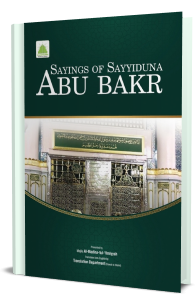
Shining Stars
The Veracity of Sayyidunā Abū Bakr
al-Ṣiddīq
Mawlana Adnan Ahmad Attari Madani
Sayyidunā ꜤAlī b. Abī Ṭālib رَضِىَ الـلّٰـهُ عَـنْهُ would stand at the pulpit and mention hadith that were narrated from Sayyidunā Abū Bakr al-Ṣiddīq رَضِىَ الـلّٰـهُ عَـنْهُ. After mentioning the hadith, he would say in a loud voice, “Abū Bakr has spoken the truth.”[1]
Dear Islamic brothers! The noble Quran, the beloved Prophet صَلَّى الـلّٰـهُ عَلَيْهِ وَاٰلِهٖ وَسَلَّم, Sayyidunā Jibrīl عَـلَيْـهِ الـسَّـلَام, the noble companions رَضِىَ الـلّٰـهُ عَـنْهُم, and every true Muslim has testified to the honesty of the first Caliph of Islam, Sayyidunā Abū Bakr al-Ṣiddīq رَضِىَ الـلّٰـهُ عَـنْهُ. Here are some significant events which highlight his truthfulness.
His name in the heavens is “Ṣiddiq”
The muhājirīn and anṣār رَضِىَ الـلّٰـهُ عَـنْهُم were with the beloved Prophet صَلَّى الـلّٰـهُ عَلَيْهِ وَاٰلِهٖ وَسَلَّم, and Sayyidunā Abū Bakr رَضِىَ الـلّٰـهُ عَـنْهُ said, “O Messenger of Allah! I swear upon your life that I have never prostrated to a false god. When I was a child, I threw a stone at an idol and knocked it over on its face. My father took me by the hand and told my mother what happened. She said, ‘Leave him. One night, I was alone, and I heard a voice that said, “O maidservant of Allah! I bring good news to you of a son. He will be known as Ṣiddīq in the heavens, and he will be Muhammad’s companion.”’” After explaining the incident, Sayyidunā Jibril عَـلَيْـهِ الـسَّـلَام entered the beloved Prophet’s court and said three times, “Abū Bakr has spoken the truth.”[2]
The Prophet صَلَّى الـلّٰـهُ عَلَيْهِ وَاٰلِهٖ وَسَلَّم named him “Ṣiddīq”
When the Prophet صَلَّى الـلّٰـهُ عَلَيْهِ وَاٰلِهٖ وَسَلَّم returned from the miꜤrāj, the disbelievers questioned him about Bayt al-Maqdis. Then, Sayyidunā Jibrīl عَـلَيْـهِ الـسَّـلَام appeared with Bayt al Maqdis in his wings, and the Prophet صَلَّى الـلّٰـهُ عَلَيْهِ وَاٰلِهٖ وَسَلَّم gave detailed answers, including the exact locations of its doors. After every answer, Sayyidunā Abū Bakr رَضِىَ الـلّٰـهُ عَـنْهُ said, “You have spoken the truth; you have spoken the truth.” The Prophet صَلَّى الـلّٰـهُ عَلَيْهِ وَاٰلِهٖ وَسَلَّم responded, “O Abū Bakr! I have named you Ṣiddīq.”[3]
Someone asked Sayyidunā Abū Bakr رَضِىَ الـلّٰـهُ عَـنْهُ, “Did you drink alcohol during the age of ignorance?” He رَضِىَ الـلّٰـهُ عَـنْهُ answered, “I protected my honour and dignity, and whoever consumes alcohol destroys his honour and dignity.” The Prophet صَلَّى الـلّٰـهُ عَلَيْهِ وَاٰلِهٖ وَسَلَّم was informed about this answer and said, “Abū Bakr spoke the truth; Abū Bakr spoke the truth.”[4]
Sayyidunā Jibrīl called him “Ṣiddīq”
On the night of miꜤrāj, the Prophet صَلَّى الـلّٰـهُ عَلَيْهِ وَاٰلِهٖ وَسَلَّم said to Sayyidunā Jibrīl عَـلَيْـهِ الـسَّـلَام, “The people of Makkah will not believe what I say.” Sayyidunā Jibrīl عَـلَيْـهِ الـسَّـلَام replied, “Abū Bakr will believe you; he is Ṣiddīq.”[5]
Sayyidunā Abū Bakr رَضِىَ الـلّٰـهُ عَـنْهُ saw the Burāq
The Prophet صَلَّى الـلّٰـهُ عَلَيْهِ وَاٰلِهٖ وَسَلَّم said, “Jibrīl brought the Burāq to me.” Upon hearing this, Abū Bakr رَضِىَ الـلّٰـهُ عَـنْهُ said, “O Messenger of Allah! I saw it.” He was told to describe it, and he said, “بَدَنَۃ.” “[Like] a camel or a cow.” The Prophet صَلَّى الـلّٰـهُ عَلَيْهِ وَاٰلِهٖ وَسَلَّم said, “O Abū Bakr! You spoke the truth; you have seen it.”[6]
Sacrificing his life
When verse 66 of Surah al-Nisāˈ was revealed (And if We made it obligatory for them (i.e. those who did injustice to their souls) to slay themselves or go out leaving their homes and families, only a few of them would therefore do it.), Sayyidunā Abū Bakr رَضِىَ الـلّٰـهُ عَـنْهُ said, “O Messenger of Allah! If you told me to kill myself, I would indeed do it.” The beloved Prophet صَلَّى الـلّٰـهُ عَلَيْهِ وَاٰلِهٖ وَسَلَّم responded, “You are telling the truth.”[7]
The truthful
Sayyidunā Abū Bakr’s father, Sayyidunā Abū Qūḥāfah, accepted Islam during Ramadan 8AH on the day of the conquest of Makkah. Sayyidunā Abū Bakr went to the Prophet صَلَّى الـلّٰـهُ عَلَيْهِ وَاٰلِهٖ وَسَلَّم and said, “O Messenger of Allah! I swear by the One Who sent you with the truth, I would have been happier at [your uncle] Abū Ṭālib having accepted Islam compared to my father, Abū Quḥāfah accepting Islam. This is because Abū Ṭālib’s embracing of Islam would have been coolness to your eyes.” The Prophet صَلَّى الـلّٰـهُ عَلَيْهِ وَاٰلِهٖ وَسَلَّم said, “You have spoken the truth.”[8]
The honest
After the Battle of Ḥunayn in Shawwāl 8AH, the Prophet صَلَّى الـلّٰـهُ عَلَيْهِ وَاٰلِهٖ وَسَلَّم said, “Whoever has killed a disbeliever and has evidence of this, he will claim the deceased’s belongings. Sayyidunā Abū Qatādah killed a disbeliever but had no evidence. Whilst he was seeking a witness, a man stood up and said, “I have the disbeliever’s possessions, so please make Abū Qatādah agree with me [that I keep the spoils].” Upon hearing this, Sayyidunā Abū Bakr رَضِىَ الـلّٰـهُ عَـنْهُ said, “By Allah, it will never happen that a lion from the lions of Allah fights for the sake of Allah and the Prophet صَلَّى الـلّٰـهُ عَلَيْهِ وَاٰلِهٖ وَسَلَّم, and the spoils of that disbeliever is given to you.” The beloved Prophet صَلَّى الـلّٰـهُ عَلَيْهِ وَاٰلِهٖ وَسَلَّم said, “Abū Bakr has spoken the truth. Give the spoils to Abū Qatādah.” After that, the man gave the spoils to Sayyidunā Abū Qatādah رَضِىَ الـلّٰـهُ عَـنْهُ.[9]
Interpreting dreams
The beloved Prophet صَلَّى الـلّٰـهُ عَلَيْهِ وَاٰلِهٖ وَسَلَّم described a dream he saw by saying, “I was in an iron dome, and honey was descending from the sky. One person licked it once or twice, some consumed more and others drank it.” With the permission of the Prophet صَلَّى الـلّٰـهُ عَلَيْهِ وَاٰلِهٖ وَسَلَّم, Sayyidunā Abū Bakr رَضِىَ الـلّٰـهُ عَـنْهُ interpreted the dream, “The iron dome is Islam, and the honey is the Quran. The person who licked the honey once or twice has learned one or two surahs, and the people who drank it are those who have brought it together.” Upon hearing this explanation, the beloved Prophet صَلَّى الـلّٰـهُ عَلَيْهِ وَاٰلِهٖ وَسَلَّم said, “Abu Bakr, you have spoken the truth.”[10]
The Quran affirms his truthfulness
Sayyidunā Abū Bakr رَضِىَ الـلّٰـهُ عَـنْهُ passed away on the 22nd of Jumādā al-Ākhirah 13 AH. Sayyidunā ꜤAlī رَضِىَ الـلّٰـهُ عَـنْهُ cried as he described the rank of Sayyidunā Abū Bakr رَضِىَ الـلّٰـهُ عَـنْهُ, “Allah describes him in the Quran with the word ‘Ṣiddīq.’”
وَ الَّذِیْ جَآءَ بِالصِّدْقِ وَ صَدَّقَ بِہٖۤ اُولٰٓئِکَ ہُمُ الْمُتَّقُوْنَ (۳۳)
He who brought the truth and he who confirms it, it is they who are pious.[11]
The Prophet صَلَّى الـلّٰـهُ عَلَيْهِ وَاٰلِهٖ وَسَلَّم is the one who came with the truth, and the one who affirmed it is Sayyidunā Abū Bakr رَضِىَ الـلّٰـهُ عَـنْهُ.[12]
Sayyidunā ꜤAlī رَضِىَ الـلّٰـهُ عَـنْهُ called him “Ṣiddīq”
Sayyidunā ꜤAlī رَضِىَ الـلّٰـهُ عَـنْهُ said, “Whenever I heard a hadith from a Companion, I asked them to swear an oath about it (that it was from the Prophet صَلَّى الـلّٰـهُ عَلَيْهِ وَاٰلِهٖ وَسَلَّم), and when they swore an oath, I trusted them. Whenever Abū Bakr narrated a hadith, I never asked him to swear an oath because he is truthful.”[13]
[1] Al-Riyāḍ al-Naḍirah, vol. 1, p. 209
[2] Irshād al-Sārī, vol. 8, p. 370
[3] Itḥāf al-Khiyarah al-Maharah, vol. 9, p. 61 Hadith: 8543
[4] Tarīkh Ibn ʿAsākir, vol. 30, p. 333
[5] Subul al-Hudā wa al-Rashād, vol. 11, p. 254
[6] Al-Durr al-Manthūr, vol. 5, p. 227
[7] Al-Durr al-Manthūr, vol. 2, p. 587
[8] Musnad al-Bazzār: 6131
[9] Ṣaḥīḥ al-Bukhārī: 4321; Sīrah Ibn Ḥibbān, p. 350
[10] Tafsīr al-Ahlām al-Kabīr Ibn Sīrīn, p. 119; Al-Ishārāt Ibn Shāhīn, p. 367
[11] Al-Quran, 39:33, Translation from Kanz al-Īmān
[12] Khazāˈin al-ꜤIrfān, al-Zumar, verse 33, vol. 5, p. 18
[13] JāmiꜤ al-Tirmidhī: 406; Sharḥ Ibn Baṭṭāl, vol. 1, p. 145


















Comments